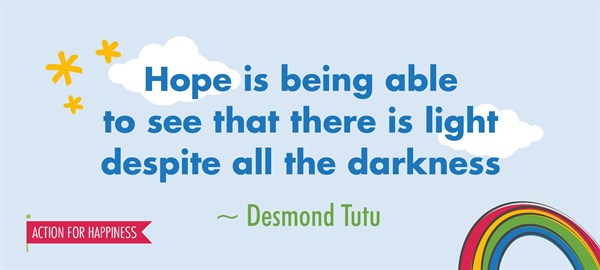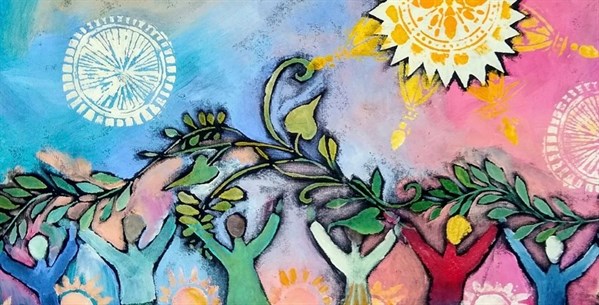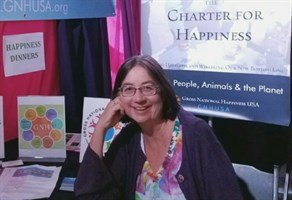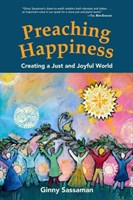Happiness Runs In a Circular Motion
04 Sep 2020 | Ginny Sassaman

"Even a happy life cannot be without a measure
of darkness and the word happy would lose its meaning if it were
not balanced by sadness"
~ Carl Jung

At a creativity retreat a few years ago, my friend Bronwyn
grabbed her guitar and said, "Ginny, this should be your song." She
then began serenading us with Donovan's song, Happiness Runs.
Bronwyn was onto something. The song's chorus repeatedly asserts
that "happiness runs in a circular motion". The more I learn about
happiness, the more I appreciate its circular nature.
The symbiotic relationship between personal well-being and a
Gross National Happiness paradigm is a great example of the
circular nature of happiness, though I'm pretty sure Donovan didn't
have that in mind in the 1960s. I also suspect that Donovan wasn't
talking about the interdependence of happiness and sadness, though
that connection is also necessary for good emotional health.
The circular motion between happiness and sadness is one that
I've spent some time with lately. A little over a year ago, I
developed troubling symptoms in my left eye - flashing, and a black
spot, called a floater. Oh, yes, and just a wee bit of
haemorrhaging behind the left retina. My optometrist sent me
immediately to a retinal specialist.
There, on a gorgeous Friday afternoon in June, I learned that my
vision was threatened by "retinal neovascularization" - bleeding
behind the retina. I had already suffered some permanent loss of
vision and would, without treatment, go blind in that eye within a
matter of months. Doctor Kim told me I urgently needed to begin
painful eye injections, starting the following Monday morning.
I was in shock. Permanent vision loss? Almost blind? Painful eye
injections? What if the medicine didn't work? What if my right eye
developed the same condition?
Over that long weekend, I unwittingly made the perfect happiness
choice: I gave myself permission to dwell in sadness. To cry. To
grieve. To acknowledge my mortality and fears about my very
breakable body. I cocooned. I didn't want to be near anybody but my
husband.
Fortunately, I rebounded pretty quickly, within the week. It
helped that the eye injections weren't that painful, and that the
doctor was reassuring about both my eyes and the efficacy of the
medicine. It also helped that I've been building my happiness
muscles for years now, and was better able to see many silver
linings. Amazingly, the medicine is only ten years old. Before
that, patients just went blind-so how lucky am I? Further, the
symptoms that sent me to the optometrist were unrelated to the
neovascularization. I am very fortunate that my vision loss was
caught before it got any worse. Plus, I had health insurance. Can
you imagine how much a retinal specialist costs? And brand new
vision-saving drugs? Thank goodness I didn't have to go bankrupt to
save my sight.
During this scary time, I posted a blog about my challenge and
received a virtual outpouring of love and support from friends
online. This filled my heart with joy.

Finally, I gained a valuable insight: happiness and sadness run
in a circular motion. Paradoxically, happiness gave me the strength
to grieve. Since I know what happiness feels like, and what I need
to do to coax it back, I didn't need to short-change the
crying.
It works the other way around, too-that is, those who embrace
the reality of suffering are better equipped to feel happy. We
can't turn off the sad without also turning off the happy. As Golda
Meir put it, "Those who do not know how to weep with their whole
heart don't know how to laugh either."
In Bhutan, where Gross National Happiness was born, they honor
this belief in national policy. On a return trip to this happy
country, Geography of Bliss author Eric Weiner found that the
residents are encouraged to think about death five times a day.
That may be more than most Americans could handle. Nonetheless, I
say, let's all have a good cry now and then. We'll laugh more
later.
The circular relationship between sadness and happiness nicely
illustrates that being your happiest self does not equate to a
lifetime of sunny skies and smooth sailing. We are inescapably
human, and fated to experience stormy seas. Trying to be happy when
you really need to feel sad is a recipe for disappointment. That
disappointment could feel like failure, thus creating deeper
unhappiness. Not good.
The last thing I want to do is make anyone feel unhappy for not
feeling happier! What I do want to do is share some of the why's
and how's of cultivating happiness so you can recover more quickly
from pain and live your best, most flourishing life.
What, then, is happiness? Because happiness is so personal, we
all have different ideas of what it means. I think of happiness as
contentment and peace of mind, with an enhanced capacity for joy,
laughter, and other positive emotions. Researchers in the positive
psychology field have used flourishing, thriving and positivity as
synonyms.
If happiness is a word that discomforts you, I invite you to
translate what I'm saying to one of those words, or perhaps
well-being. It isn't the word that matters, it's the concept.
I definitely like the word happiness. Aristotle wrote:
"Happiness is the meaning and purpose of life, the whole aim and
end of human existence." The whole aim and end of human existence.
I think that's pretty good. I'll stick with happiness.

About The Author
Ginny Sassaman, M.S., C.I.P.P. is a happiness
advocate, lay preacher and author of a new book Preaching Happiness: Creating a Just and Joyful
World (Rootstock Publishing, 2020). Ginny is also a
co-founder and past president of Gross National Happiness USA.
"Happiness Runs in a Circular Motion" is an excerpt from Chapter
2 in Preaching Happiness: Creating a Just and Joyful World and
is reprinted with permission of the author.

